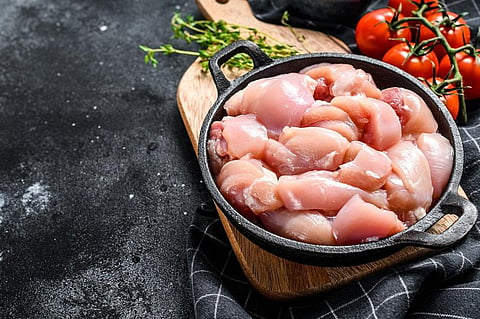Antimicrobial resistance: Here are some practices to ensure safe poultry
Antimicrobial resistance (AMR) is now widely acknowledged as a public health issue. AMR harms people’s health and impacts economies. Rampant usage of antibiotics in humans and animals may lead to an AMR pandemic. AMR has even impacted more recent and powerful antibacterial substances like carbapenems.
Nearly 1.27 million fatalities a year have been directly linked to AMR. Meat consumption introduces antimicrobials into the food chain, impacting the environment, humans, food and animals.
The efficacy of antimicrobials is reducing due to the rise of antibiotic-resistant bacteria. It also proliferates unchecked spread of antibiotic-resistant genes in non-clinical environments.
Actions must be prioritised and coordinated across all stakeholders to address this situation. Continuous surveillance of antimicrobial resistance in bacteria that infect humans and animals is crucial for tracking changes in the antimicrobial susceptibility patterns of these organisms.
The Government of India’s National / State Action Plan is comprehensive. It is aligned with World Health Organization’s (WHO) Global Action Plan (GAP) for AMR. The plan addresses the five main goals outlined in the GAP and includes a new goal to enhance India’s position as a global leader in AMR.
The strategy suggests using the ‘One Health approach’ to focus on several important AMR-related issues in human and non-human sectors (such as agriculture, fishery, animal husbandry and environment).
‘One Health’ is an integrated, unifying approach to balance and optimise the health of people, animals and the environment.
India is the largest importer of antibiotics in the world ($1.33 billion a year). Antimicrobial resistance is steadily increasing in India, not just through medicine but also through water, crops, cattle and other sources, according to the fifth report from the Indian Council of Medical Research.
The fast food sector continues to be one of the largest consumers of poultry. The chicken industry in India alone is expected to increase to almost 6.3 million tonnes by 2023.
Antibiotics are widely used in animals in industrial farming for enhanced growth and disease prevention (prophylactic usage).
Poultry sans AMR
Five years ago, the poultry sector was not prepared for initiatives on the AMR front. It has been challenging, but Jubilant Foodworks Ltd’s (JFL) perseverance has paid off.
JFL established an ecosystem of research and development specialists, veterinarians, food technologists, suppliers and academicians to ensure the highest levels of quality and food safety/hygiene at all of our restaurants, slaughterhouses and farms.
We put our antibiotics avoidance policy into reality, emphasising the sourcing standards and farm practices.
We have successfully moved towards avoidance of the usage of antibiotics for prophylactic treatment as well as a growth promoter. We are making interventions to ensure that treated birds don’t enter the supply chain.
JFL continues to lead initiatives in the following areas.
Tracing bird lifecycles: Surveillance or audits, sampling the feed and monitoring slaughterhouses are key to successful implementation of the policy.
JFL works with its business partners to ensure feed mills and converters have designated lines for “no antibiotics” usage. Antibiotics should only be used when necessary and under a veterinarian’s prescription. Treated poultry is kept out of JFL’s supply chain.
Usage of natural supplements: Antibiotics can be replaced with — essential oils (for better digestion), Salstop (to stop the growth of pathogenic bacteria) and liver tonics (like Hepatocare and Toxiliv B).
Structural training: All farmers and flock handlers who work with live birds are trained specifically for the “no antibiotics policy”.
Oversight for disease prevention: Our team of veterinarians collaborates with suppliers to ensure that antibiotics are used sparingly and only when necessary to maintain their effectiveness.
They also prevent using those birds in the supply chain of JFL. The administration of vaccinations is done under the direction of licenced veterinarians. A licenced veterinarian develops a tight health programme. It is implemented under their direct supervision to maintain poultry birds’ health and well-being.
Sustainable sourcing policies: All farms that provide chicken to JFL put good farming methods into effect. Some of the deliverables for JFL’s suppliers/farms include providing constant, high-quality feed that is always accessible.
Cleaner eggs, better management of broiler farms, adequate stocking density on broiler farms and a robust bio-security policy for farms and hatcheries — contribute to ensuring animal well-being.
Enhanced audits, quality control measures: Record-keeping is essential to ensure the finest farming methods. These treatment and result records are used to assess and enhance the animal health care programme. Veterinarians appointed by JFL periodically review these records.
Campaigns on AMR: JFL is currently updating and renewing its antibiotics/poultry policy, moving towards 100 per cent ‘no antibiotics ever’ chicken.
Devendra Yadav is the vice president of quality, food safety and regulation at Jubilant Food Works Ltd
Views expressed are the author’s own and don’t necessarily reflect those of Down To Earth

